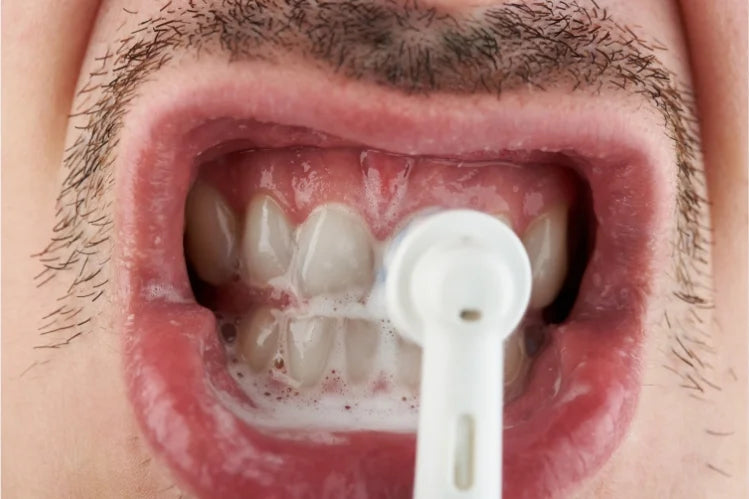
Table of Contents
- What is Teeth Polishing?
- Why Is It Used?
- Different Teeth Polishing Procedures
- Benefits of Teeth Polishing
- Teeth Polishing Side Effects You Need To Know
- Are At-Home Teeth Polishing Procedures Helpful?
- What is Teeth Whitening
- Different Teeth Whitening Procedures
- At-home Teeth Whitening
- Difference Between Teeth Polishing and Teeth Whitening
- FAQs
Tired of your pale and dull smile? If so, this might be the perfect time to begin your dental treatment to brighten up your smile. When it comes to achieving a radiant white smile, teeth polishing and teeth whitening are two main dental procedures. And while both these procedures help achieve a perfect smile, are they truly different? In this blog, we will explore how these procedures are carried out, the benefits, side effects, and what to expect.
What is Teeth Polishing?
Teeth polishing is a dental technique used for teeth cleaning using different tools and procedures that make tooth enamel appear glossy and help achieve the perfect smile. A stain or plaque - anything that has a bad impact on your smile is removed in this treatment.
Why Is It Used?
If you wonder why your teeth are not perfectly cleaned, even after brushing them twice a day, you may need a dental procedure to do so. Sometimes, brushing cannot remove bacteria in your mouth, which can lead to poor hygiene. Such improper cleaning can cause dental stains and plaques, which are then removed by a dental procedure. At its core, teeth polishing is responsible for the following things:
- Removes stains
- Brightens your smile
Different Teeth Polishing Procedures

Image: Dentist performing teeth polishing procedure
Therapeutic Polishing
A type of teeth polishing procedure in which dental surgery is done to maintain your dental hygiene. Research says that around seven hundred oral microflora are present in the roots of teeth. This can be a reason for the development of plaques on your teeth.
Therapeutic teeth polishing exposes the cementum of a tooth, helping to remove microflora and improving your oral hygiene.
Cosmetic Polishing
Cosmetic polishing, also known as coronal polishing, is responsible for removing stains from the enamel layer — the outermost protective layer of the teeth. It involves different abrasive teeth polishing brushes and pastes to create a shiny layer on the teeth.
Superficial Polishing
This type of teeth polishing focuses on cleaning the crowns of the teeth. Crowns are dental caps placed on the teeth for their protection. If a patient has a dental filling or a root canal, a dental cap is placed on the tooth to keep it secured. Cleaning them avoids bacterial growth and boosts the oral health of the patient.
Selective Polishing
When you go through a polishing procedure, some stains may still remain. In this case, your dentist may decide to go for scaling or any other polishing technique to remove them.
Teeth whitening prices may vary depending on the procedure you are going through. Your dental procedure may get extended if visible results are not noticed; hence, you may have to pay more.
Benefits of Teeth Polishing

Undergoing teeth polishing procedures will offer you the following benefits:
Aesthetics
A glossy smile will provide you with enhanced aesthetics and superior looks.
Removes Plaques
Due to improper brushing, food particles may get stuck in your teeth, which leads to plaque accumulation. These dental plaques can only be removed with the help of dental procedures.
Teeth Polishing Side Effects You Need To Know
This procedure, no doubt, benefits in multiple ways but has different side effects as well. Make sure your dentist examines your dental health before your treatment.
Image: Dentist holding teeth polishing paste.

Enamel Damage
Since teeth polishing involves abrasive brushing, it may damage your enamel. A torn enamel makes your tooth sensitive to hot or cold items.
Sore Gums
If you have sensitive gums, you may experience redness, irritation, or swelling.
Allergic Reactions
The tooth polishing procedure involves the use of different products that can cause an allergic reaction in a person. Make sure you are aware of the polishing solutions and their ingredients to avoid any health issues.
Are At-Home Teeth Polishing Procedures Helpful?
There are multiple teeth polishing kits available on the market to keep your smile bright and white. These usually consist of abrasives to polish your teeth, such as specialized toothpaste. But you need to know that some ingredients might be too harsh for your teeth.

It is important to note that teeth polishing is a dental process only to be carried out by professionals. This means only experts can remove dental plaques and tartar from your smile. For safe treatment, be sure to book an appointment with your dentist to get your smile polished.
What is Teeth Whitening
It is a dental procedure that aims to brighten the smile by lightening the color of your teeth. This can be done by using different bleaching agents, such as baking soda. A perfect white smile can boost your confidence and promote oral health.
The impact of a professional teeth whitening procedure is not permanent and can last for a maximum of three years. Moreover, the treatment result also depends on the person’s dental condition. The longer you keep the bleaching agent on your smile, the more white your teeth get.
Different Teeth Whitening Procedures
The procedure to lighten down the color of your smile can be done in different ways:
In-Office
This teeth-whitening procedure is carried out under the supervision of professional experts and hence requires multiple dental visits. During in-office treatment, a whitening gel is applied to your teeth. The duration of application of this gel depends on how lighter the shade of your teeth is required.
To increase the effectiveness of this gel, your dentist may use a laser that accelerates the bleaching agent. If you want quick results, in-office teeth whitening is the right treatment for you.
At-Home
If you are someone who wants to go through whitening treatment in the comfort of your own home, at-home teeth whitening kits may suit you. The kit includes a custom tray, a whitening gel, and an instruction guide. Apply the gel to the tray and simply place it in your mouth. This way, your smile will be evenly whitened with no remaining spots.
Since the gel used in at-home treatment is lighter, it requires more time to achieve results. For those who experience extreme sensitivity, this is the best way for you to whiten your smile.
At-home Teeth Whitening
As mentioned above, teeth whitening can be done at home. For this purpose, ALIGNERCO offers an at-home teeth whitening kit to fulfill your needs. It has all the essentials you require to remove all those stubborn stains from your smile. It includes the following items:
- LED light
- Whitening gel pens
- Mouth tray
- Shade guide
- Detailed instructions

Image: Teeth whitening kit for removing dental stains.
Difference Between Teeth Polishing and Teeth Whitening
| Teeth Polishing | Teeth Whitening | |
|---|---|---|
| Purpose | Smoothes the surface of teeth by removing stains | Lighten the color of your smile |
| Procedure | Abrasive polishing pastes | Bleaching agents such as peroxides |
| Major side effects | Enamel damage, sensitivity, and allergic reactions | Temporary gum and tooth irritation |
| Results | Right after the treatment | It may take weeks or months for visible results. |
To sum it up, teeth polishing and teeth whitening are both done to enhance your aesthetics, yet they are carried out in different ways. Teeth whitening lightens the shade of your smile, whereas teeth polishing smoothes the surface of teeth. Your perfect dream smile can be achieved through these procedures, depending on your dental conditions.
FAQs
1. How long does teeth polishing last?
The longevity of teeth polishing is around six months, but it also varies depending on a person’s dental condition.
2. How long does teeth polishing take?
The duration of the teeth polishing procedure depends on the condition of your smile and plaque accumulation. An average checkup may take 30 minutes to an hour.
3. How long after teeth polishing can I eat?
You are allowed to eat as soon as your procedure is done. But if your dentist did a fluoride treatment on your smile, you need to wait for thirty minutes.
4. Is teeth polishing necessary?
If you notice even minor plaque accumulation, you can go for this treatment. This treatment ensures your aesthetics and bright smile.
5. Is teeth polishing safe?
If you have sensitive teeth, you can experience enamel damage due to the abrasives used during the procedure.
6. Is teeth polishing painful?
If this dental treatment is carried out carefully, it will not hurt. You might experience slight irritation in gums due to the strong products used in the procedure.
7. Does teeth polishing remove enamel?
Since this treatment is done to bring shine to the teeth surface, chances are it may damage your enamel, leading to sensitivity.






